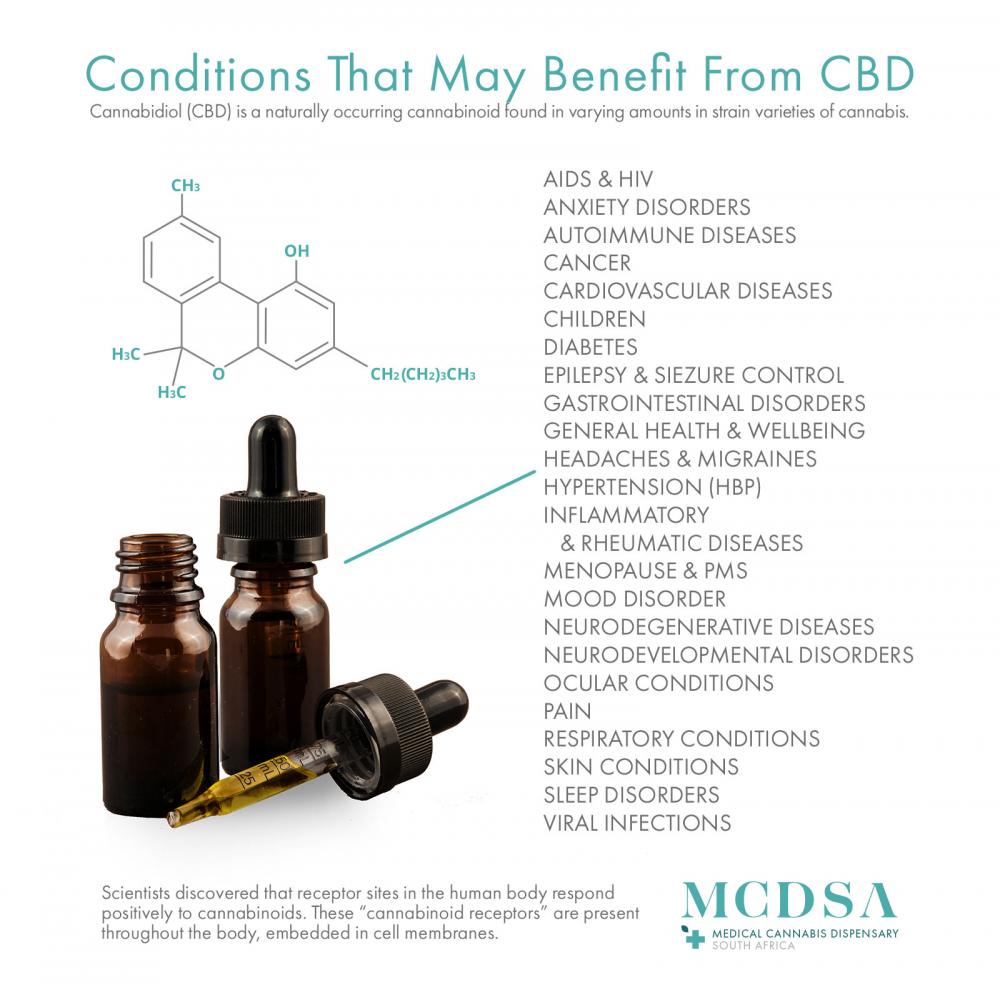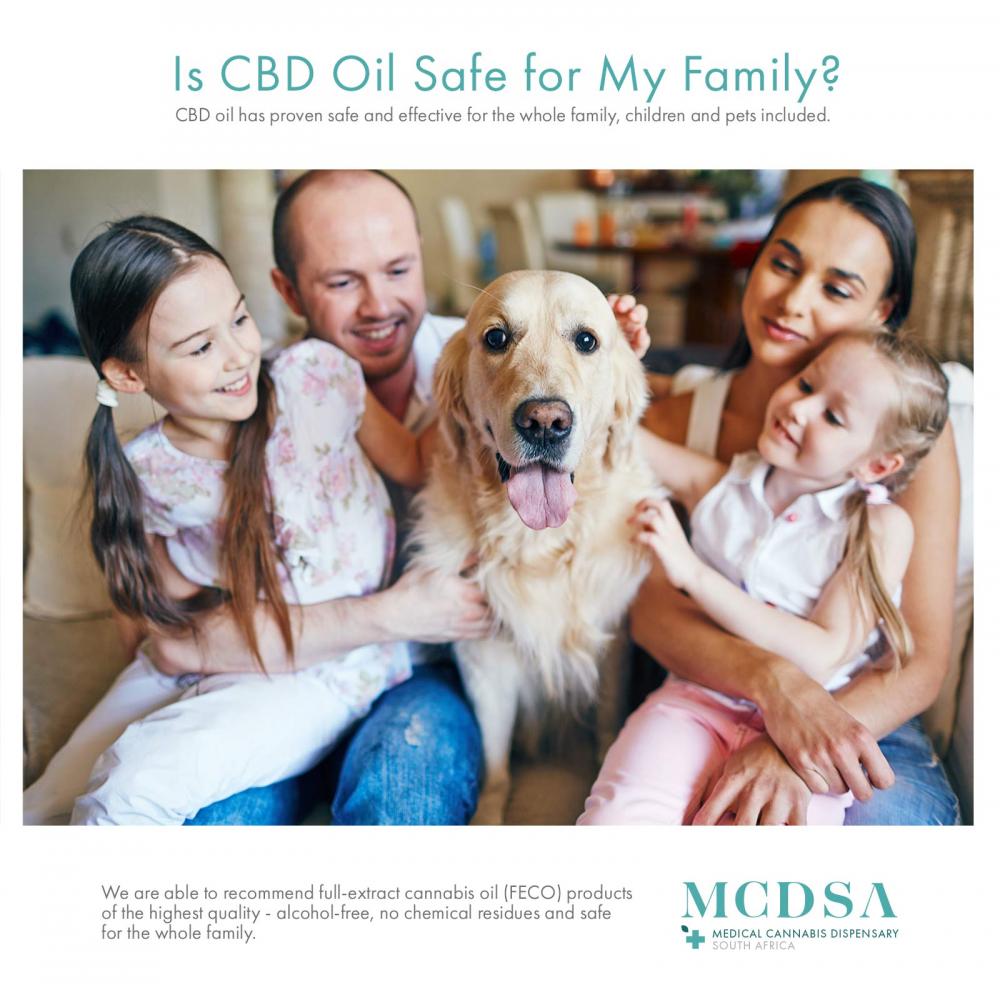CBD Oil In South Africa
CBD may be the cannabinoid with the most profound healing potential. It causes no psychoactive effects and has proven safe for a wide range of therapeutic applications across all ages and even in pets. Separating the real thing from the imposters is important when sourcing an oil capable of effectively treating medical conditions.
In this Article
What is CBD?
Cannabis is renowned for the psychoactive effects of the compound THC (delta 9-tetrahydrocannabinol). However, this is just one of many cannabinoids that have significant healing potential. In fact, there are over 120 different cannabinoid varieties in the marijuana plant and more than 500 compounds in total.
Cannabidiol (CBD) is a naturally occurring cannabinoid found in varying amounts throughout common strain varieties – indica, sativa, ruderalis as well as low THC “hemp”. In recent years, this compound has been at the forefront of many exciting scientific studies, where it has been investigated for its vast therapeutic effects and applications. CBD appears to have a high degree of medicinal value and is non-psychoactive – in other words, it does not cause one to become intoxicated or get “high”.
In addition to cannabinoids, more than 100 terpenes and over 20 flavonoids have been identified in cannabis. These are significant because evidence suggests that all cannabis compounds work better synergistically, than they do in isolation – a phenomenon known as the “entourage effect”. This collaboration is believed to be central to CBD reaching its maximum medicinal potential.

Know the Different Oil Types
With a wealth of often contradictory information at your fingertips, it can be difficult to know which sources to trust. At MCDSA, we champion health and pride ourselves on delivering the facts that will help you to separate the real thing from the pretenders. Typically, there are several considerations when choosing a CBD oil. The first is to choose between the following:
- Full-spectrum oil contains all of the cannabinoids (including THC and CBD) and other marijuana compounds, such as terpenes and flavonoids.
- Broad-spectrum oil is extracted in a manner that allows it to maintain CBD and other beneficial plant compounds, but not THC.
- CBD isolate separates all other compounds out and leaves behind pure CBD.
Each has its place but be wary when choosing a product suitable of treating a medical condition. The further down the list you go, the more the product leans towards a nutraceutical, with less medicinal value. Separated and isolated products contradict the whole-plant medicine principle known as the “entourage effect”, whereby all plant compounds are believed to work better synergistically than they do in isolation.
Significantly, evidence points towards an important synergistic effect between THC and CBD. Therefore, we recommend using only full-spectrum oil, derived directly from marijuana plant flowers along with all beneficial compounds (including THC), just as nature intended.
The next consideration involves deciding between oil derived from CBD-rich marijuana versus “hemp”:
- CBD cannabis oil is extracted from CBD-rich flowers and sometimes other plant material. These oils are usually regulated as medicines and made in a controlled laboratory setting, which allows for consistent quality and accurate dosing.
- Hemp oil is made from plant materials of extremely low THC plants (below 0.3%). It is usually made from various plant materials, rather than flowers only. Some contain effective therapeutic doses of CBD, but product consistency can vary greatly as it is usually unregulated.
- Hemp seed oil is a nutritional supplement rich in omega 3 and 6 fatty acids. The seed material is sold separately for its amino acid and vitamin qualities. This oil’s therapeutic value as is considered insignificant as it contains little to no CBD.
According to the botanical definitions, “hemp” describes low THC varieties of Cannabis sativa plants, whereas both modern-day classifications of “sativa” and “indica” strains are respectively classified as Cannabis indica ssp. indica and Cannabis indica ssp. afghanica. Ruderalis is a separate, wild variety famed for its autoflowering traits, but not usually associated with CBD oils.
It is essential to source reliable, medical-grade products when dealing with health conditions. For medicinal applications, cannabis oil extracted from modern indica, sativa or indica-sativa hybrid strains is preferred to hemp oil. Most contemporary strains are in fact hybrids. However, there is a big difference between the premium-quality products that we recommend and regular CBD oil:
- Full-extract cannabis oil (FECO) is recommended. It is made from organic CBD-rich flowers via solvent-free extraction. No chemical residues or unhealthy additives allows for full therapeutic benefits without any harmful exceptions. Formulated in a controlled laboratory setting for accurate dosing.
- Regular CBD oil is sometimes made from all plant materials, which may or may not contain chemical residues from the cultivation or extraction processes. Chemicals and unhealthy additives (like alcohol, artificial flavouring, preservatives and residual solvents) may offset the beneficial health effects to a certain extent.
Take note: we only recommend full-extract cannabis oil (FECO) fit for medical use and made from organic plant flowers via solvent-free extraction, without any chemical residues or unhealthy additives. The only time it is preferable to use a CBD isolate or hemp-derived product, is when seeking to avoid THC showing up in a drug test. Even then, a small amount may still present due to products being unregulated.
How CBD Works in the Body
The endogenous cannabinoid system (ECS) was named after the cannabis plant.
Scientists discovered that receptor sites in the human body respond positively to cannabinoids. These “cannabinoid receptors” are present throughout the body, embedded in cell membranes. Phytocannabinoids (“phyto” meaning plant) from marijuana, such as CBD and THC, interact with these receptors that are naturally designed for our innate endocannabinoids, manufactured within the body. Researchers have identified two main types:
- CB1 receptors: mostly located in the central nervous system, connective tissues, gonads, glands and organs.
- CB2 receptors: predominantly found in the immune system and its associated structures.
The ECS performs different tasks specific to different tissues, but the overall goal is always the same: homeostasis, in other words, the maintenance of a stable internal environment despite fluctuations in the external environment. When stimulated, a variety of physiological processes ensue.
Some known beneficial effects of CBD include:
- Addiction: promotes brain tissue growth in alcoholism; reduces nicotine cravings.
- Antimicrobial: helps kill certain bacteria, fungi, viruses and parasites.
- Cancer: initiates apoptosis; inhibits cell growth in tumours; reduces nausea and vomiting.
- Cardiovascular: reduces risk of arterial blockage.
- Diabetes: regulates blood sugar and reduces insulin resistance.
- Gastrointestinal: reduces contractions in small intestine; suppresses appetite.
- General: relieves pain, inflammation and muscle spasms; promotes bone growth.
- Immune: suppresses and regulates immune system function.
- Neurological: neuroprotectant; reduces seizures and convulsions.
- Psychological: relieves anxiety; tranquilising effects to manage psychoses.
Visit Cannabis Science for a wealth of in-depth information on how cannabis interacts with the human body.

Therapeutic Applications
CBD (cannabidiol) has an incredibly wide range of therapeutic properties. Research indicates that CBD may be effective at easing symptoms in diabetes, epilepsy, PTSD, rheumatoid arthritis and neurological disorders. It has demonstrated neuroprotective effects and its anti-cancer potential is currently being explored at several research institutions around the world.
On its own, CBD is both anti-proliferative (impeding the spread of cells) and tumour-reducing, whilst at the same time having analgesic, anti-inflammatory and anti-anxiolytic effects. However, THC and CBD work synergistically with each other in treating cancer and a host of other ailments. CBD’s ability to counteract the psychoactivity of THC, also allows a higher therapeutic dose to be tolerated.
Hence, one should always enquire about the CBD:THC cannabinoid ratio of a product and ensure that this matches to the recommendation for your specific condition. CBD’s ability to soothe pain, inflammation, anxiety and other symptoms extends beyond cancer treatment into various other health conditions.
Some potential CBD treatment avenues include:
- AIDS & HIV
- Anxiety Disorders
- Autoimmune Diseases
- Cancer
- Cardiovascular Diseases
- Children
- Diabetes
- Epilepsy & Seizure Control
- Gastrointestinal Disorders
- General Health & Wellness
- Headaches & Migraines
- Hypertension (HBP)
- Inflammatory & Rheumatic Diseases
- Menopause & PMS
- Mood Disorder
- Neurodegenerative Diseases
- Neurodevelopmental Disorders
- Ocular Conditions
- Pain
- Pets
- Respiratory Conditions
- Skin Conditions
- Sleep Disorders
- Viral Infections
Explore our Treatment Guidelines for a comprehensive list of conditions that may benefit from using CBD oil. For example, you’ll find ADHD/ADD in Neurodevelopmental Disorders and Multiple Sclerosis (MS) in Autoimmune Diseases.
MCDSA Recommendation
Medical Cannabis Dispensary is able to recommend some of the purest, strongest and most consistent CBD oil available on the South African market – sourced from organically grown, CBD-rich cannabis strains for the purpose of maximum therapeutic benefit.
The products we suggest are formulated using only organic cannabis flowers from strains with high CBD and low THC concentrations. Full-extract cannabis oils (FECO) high in CBD but containing sufficient THC to enact the entourage effect. However, by extracting from strains with a THC content of less than 1%, it is virtually impossible to experience psychoactive effects. This means all of the medicinal properties without getting “high”.
When you place your trust in us, we ensure that our recommended products are reliably sourced from suppliers who maintain strict hygiene principles and use minimally intrusive extraction methods in their labs. The oil is completely free from any herbicides, pesticides, GMO products, preservatives or any other form of chemical additive. You are getting pure CBD in a carrier oil (medium-chain triglycerides or “MCT”) and sunflower lecithin – nothing else added.
The recommended daily dosage of the products we endorse is usually in the region of 5-10 drops (15 to 30mg), taken 1-3 times daily, although this always depends on each specific ailment or condition and we always advise to start with a single drop. Despite their natural nature and lengthy shelf-life, oils are perishable products and should be stored in a cool, dark place – ideally a fridge.
Dealing with a medical condition is challenging enough, without adding further toxic and chemical burden to the body. Be sure to always source medicinal cannabis products from reputable sources. Find out exactly what to look out for when sourcing a product in Cannabis Oil.
Please visit our Product Guide for the full scope of products that we advocate or contact us below for our trusted recommendation on the healthiest, highest-quality CBD oil products (capsules and tinctures) available in South Africa.
Disclaimer
All information on this page is subject to MCDSA’s disclaimer.



